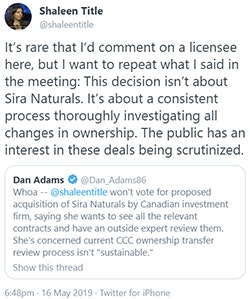
The Massachusetts Cannabis Control Commission was all set to approve a Canadian company’s acquisition of Sira Naturals, but regulators pumped the brakes and called for greater scrutiny into the deal—and into similar deals moving forward.
In October 2018, Toronto-based Cannabis Strategies Acquisition Corp. announced that it would acquire Sira Naturals. The company trades on the Nasdaq, and its management team combined the Sira Naturals news with acquisitions of four other cannabis businesses in Nevada and Colorado. Cannabis Strategies Acquisition Corp. is a SPAC, which means that it leverages public investments for private equity transactions.
Sira Naturals holds vertically integrated licenses, and currently operates three dispensaries in the state.
The request to change ownership is a sensitive topic in Massachusetts and elsewhere right now, in light of rapid market consolidation and especially in light of a recent Boston Globe report on major companies asserting ownership of more than the allowable number of cannabis business in the state. Regulatory approval is needed to complete these M&A transactions in the cannabis space, and recent debates over the expanding scope of ownership for some multi-state operators has prompted questions about who’s moving into a particular state-legal cannabis market.
At its May 16 meeting, the state’s Cannabis Control Commission pushed back on Cannabis Strategies Acquisition Corp. During the debate over the recommendation to approve this transaction, commissioners decide to pursue even more records from the Canadian company.

Commissioner Shaleen Title said, “It’s in the public’s interest to scrutinize these transactions.”
She requested that the commission seek “all legal documents that address this transfers of ownership, whether public or not.”
Prior to the meeting, the commission’s leadership team had performed its required due diligence on the transaction and offered a recommendation to approve the deal.
“In this instance, I want to thank the staff,” she said. “I believe that you’ve gone above and beyond to review this transaction, to review hundreds of documents. I have full confidence in the staff, and I appreciate it. But as I look ahead, as this is the first time we reviewed a transaction like this, I’m thinking about establishing a fair and consistent process and I’m not sure that this is sustainable. The reason I’m focused on the process is because there is a long queue of these changes to be reviewed.”
The commission dug into what Title was looking for, pointing out that investor contracts and management agreements had already been requested. The group questioned what a “practical” request for legal documents—beyond what has already been released to the commission—would look like.
Chairman Steve Hoffman circumscribed Title’s amendment a bit, specifying that the commission would request all documents relevant to ownership, control and cap limitations. “We want these documents because we have specific issues or specific things that we’re concerned about and we want to make sure we’re comfortable with before taking a vote,” he said.
The other question became one of timelines: At what point does the process of regulatory scrutiny need to give way to a timely vote on the matter?
“We are not bound by any external deadline on this,” Hoffman said. “I think, however, in our decision-making, we should be cognizant that these deals do—some of them do have timelines, [and] that we will be causing economic impact if don’t approve or disapprove within a certain timeline.”
The commission delayed the vote on the change of ownership, and allowed Cannabis Strategic Acquisitions Corp. to return with more corporate documents within a week.
The commission will meet again May 30.
The commission also debated whether to bring in a third-party agency to probe these change-of-ownership acquisition deals.
Executive Director Shawn Collins, whose team oversees the due diligence process on changes of ownership, said that any third-party investigation into an acquisition would match the level of detail that his staff is already putting into the work. And the investigations into changes of ownership are just one portion of those staffers’ workload, which also includes facility inspections and application evaluations. He did say, however, that adding a layer of scrutiny would increase his team’s “bandwidth, scalability and the ability the turn around [investigations] faster.”
With an increasing pace of M&A moves around the cannabis industry, and with the Massachusetts Cannabis Control Commission already taking the lead on debating and scrutinizing those market forces, any lasting trends that emerge from conversations over ownership changes will be worth watching in all corners of the cannabis industry.
“For me, this is about fairness and consistency—not necessarily just this one,” Title said.

























